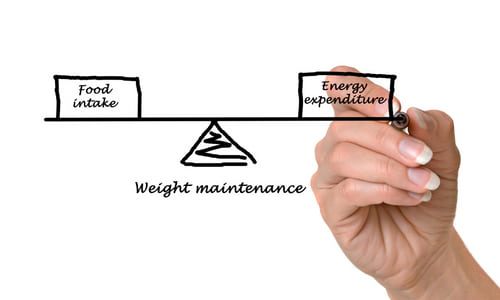How to Gain Weight with a Fast Metabolism
“How to Gain Weight with a Fast Metabolism” was written by Kristen Puente, RDN & edited/reviewed by Aly Bouzek, MS, RDN.
In today’s health and wellness industry, the focus seems to be on weight loss. But, what happens when someone is having trouble gaining weight – specifically due to a fast metabolism?
When trying to gain weight healthfully, some people may wonder if the answer is the opposite of the weight loss solution. Does this mean eating more and not exercising will lead to weight gain?
This assumption is half correct.
As most of us assume, weight gain may be achieved by increasing overall calories. This is because consuming additional calories past our needs causes a calorie surplus.
Additionally, adding a resistance-type exercise can help with gaining weight by adding lean muscle to the body. This article will explore, more in-depth, how to gain weight with a fast metabolism.
Factors Impacting Weight Gain

Things that impact weight gain are unique to each individual.
These factors can depend on a combination of factors that we cannot control, as well as ones that we can control.
Some factors that we cannot influence, or change, include:
- age
- genetics
- medical conditions
However, we can control some factors such as:
- our diets
- amount of physical activity
- lifestyle choices
All of these factors may affect your individual metabolism, thus affecting your ability to lose, maintain, or gain weight. Diet and physical activity are commonly combined to change weight.
Metabolism, Calories, and Weight
What does it mean when someone says that you have a fast metabolism or a slow metabolism? Let’s start with understanding what metabolism is.
Metabolism is the process of the body breaking down larger molecules into smaller molecules (whether from food, medicine, or other substances).
When our bodies break down food during metabolism, calories from carbohydrates, protein, and fat will be:
- used for energy
- will be stored as energy for our body to use later
- will be stored as fat in our cells
Carbohydrates are metabolized or broken down into glucose, whereas fats are metabolized into fatty acids and glycerol. Glucose is our body’s main source of energy. Fatty acids and glycerol are also important energy sources and provide us with essential nutrients.
Proteins are broken down into “building blocks” in the form of amino acids. Amino acids help to build muscle in our bodies and can be used for energy like carbohydrates and fat.
Fast Metabolism
The rate of each person’s metabolism is highly individualized and is affected by all the factors mentioned above.
A fast metabolism means that your body may break down and use calories faster than other people’s metabolism. For this reason, you may struggle to gain or maintain your weight as your body uses calories quickly.
Calories and Weight Gain
As mentioned, weight gain can be achieved by dieting and adding physical activity. Adjusting to increase your overall calorie intake leads to weight gain by providing your body with more calories than it uses or needs.
Your body can then store these extra calories and can help with increasing your body weight.

We all have a certain number of daily calories that we need for our body to perform basic functions of living while we are at rest.
This is called your Resting Energy Expenditure, or REE for short, and it does not include calories needed to perform any activities when not at rest.
When figuring your REE, particular equations are multiplied by a specific number, known as an activity factor.
This number depends on your activity level, and increases as your physical activity levels increase.
Your REE multiplied by the activity factor will give you the daily calories needed to maintain your body weight. When you exceed this number of calories, you are creating a calorie surplus. This will cause your body to store the excess energy from calories, causing weight gain.
For more information regarding REE, check out the National Academy of Sports Medicine’s Resting Metabolic Rate article.
Diet
Adjusting your diet is a great goal if you’re questioning how to gain weight with a fast metabolism. Increasing calories, adding in meals and snacks, and adding nutritional supplements to your diet are all helpful ways to increase your weight.
Increasing Calorie Intake
As mentioned, diet can be adjusted to help promote weight gain. The specific amount of calories needed for weight gain is different for each person.
However, adding an additional 300-500 calories per day to your diet is a good starting point for a healthy weight gain of about one pound per week.
If you need to gain a more significant amount of weight, consuming 700-1000 additional calories per day may lead to a two-pound per week weight gain.
Therefore, it is essential to monitor your weight changes and adjust calories accordingly, as it is not recommended to gain more than two pounds per week.
Keep a log of the foods you eat for a few days before adding additional calories to your diet to get an idea of your average calorie intake. After you know the amount of calories you are consuming, you can then add extra calories and track any weight changes.
You can also track your foods after the initial first few days to ensure that you are meeting your overall calorie goal. One of the advantages of today’s technology is that numerous apps and websites can help you track foods and count calories.
Otherwise, there’s nothing wrong with a journal and handwritten notes!
Meals and Snacks
Some ideas to increase your calorie intake are to either:
- Increase the caloric value of your meals and foods that you already eat
- Add foods to your overall intake by adding additional meals or snacks throughout the day
When trying to increase the calories of foods you eat, you can modify existing recipes by changing how the food is prepared, by adding ingredients, or by substituting ingredients with higher calorie options (light yogurt vs whole milk yogurt).
Other ideas are sautéing foods in butter or oil and adding ingredients, creams, sauces, or gravies to your meals.
Modifying recipes is often an excellent way to increase the overall calorie amount of your foods without adding excessive volume to the meal. This may be helpful if you have a low appetite or get full quickly.

If adding food is not a problem, then additional meals or snacks may be a good option to increase calories.
For snacks, aim for choices that are calorie-dense AND nutrient-dense.
Foods high in “healthful” fats such as nuts, nut butters, seeds, avocado, and reduced sodium olives can provide a good amount of calories per serving due to their fat content.
Other healthful calorie-dense snack foods include whole and dried fruit, full-fat dairy, and whole grain products.
Overconsumption of foods high in sugar and saturated fat may help increase weight but should be avoided in excess because they can increase your overall risk of harmful diseases such as cardiovascular disease and type 2 diabetes. (1)
Beverages and Oral Nutrition Supplements
If the volume (or amount) of food is difficult for you and you are unable to increase meals or snacks, then try adding a nutrition supplement beverage in between meals.
Liquids are emptied from the stomach faster because they are easier to digest than solids. Full-fat milk, weight gain milk, 100% fruit or vegetable juice, or nutritional supplement beverages such as Boost or Ensure can provide around 100-240 additional calories per serving.
Another option would be a smoothie made with fruit, dairy, and seeds such as flax or chia seeds. This would help to increase your calories and would provide you with additional nutrients.
Physical Activity
Besides diet, physical activity is another great way to improve your overall health and to help you gain weight. We know what you are thinking, “I thought exercise helps us lose weight.” This is true, but results vary depending on the type of exercise.
While cardio-type workouts help burn fat, causing weight loss, strength or resistance training exercises help with weight gain by stimulating muscle growth. In addition, increasing muscle mass helps to increase the number on the scale without adding bulk to the body.
Some strength training and resistance training exercises include:

- Push ups
- Squats
- Lunges
- Weight lifting (machines or dumbbells, barbells, kettlebells)
- Mountain climbers
- Plank
- Glute bridge
Building Muscle
When trying to build muscle, aim for resistance or strength exercises that stimulate muscle growth at least 3-5 times per week.
Remember that as muscle mass increases, your overall calorie intake may need to be increased as well. This is to help with maintaining body weight since muscle is more metabolically active and thus may require more overall calories.
In addition, consult with your health provider before beginning any physical activity.
Importance of Protein
When trying to gain muscle, it is important to provide your body with additional calories and protein to support muscle growth. Calories help give the energy to perform physical activity, while protein helps provide the building blocks for new muscle growth.
Some great sources of protein include meat such as lean poultry, fish, eggs, and dairy. Protein can also be found in smaller amounts in non-plant sources such as beans, nuts, seeds, tofu, grains, and vegetables.
Another great option is protein supplements such as protein bars or protein powders that can be added to shakes and smoothies.
Conclusion: How to Gain Weight with a Fast Metabolism
Overall, when you need to know how to gain weight with a fast metabolism, the answer may be diet and physical activity. Changes can be made to your diet to increase calories anywhere from 300-500 calories per day for a weight gain goal of one pound per week.
As this number is just a starting point, calories may be adjusted up or down based on how your weight responds.
In addition to diet, adding physical activity that includes strength training 3-5 times per week can also help increase your weight by supporting muscle growth. It is important to remember to provide your body with adequate calories and protein to support muscle growth.
For more food and snack ideas, check out these high calorie foods articles. And be sure to check out our archive of topics on gaining weight!
